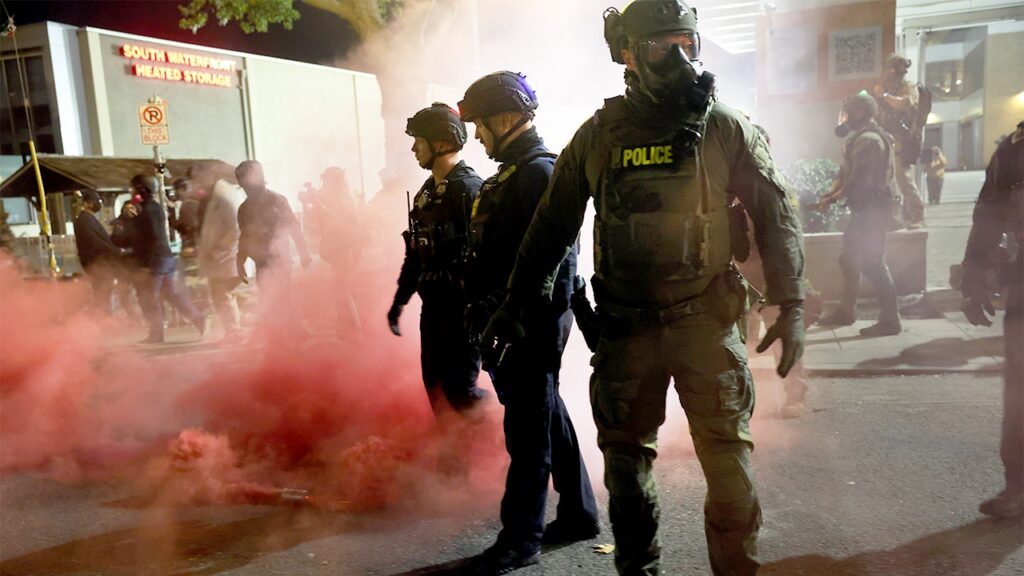In a recent opinion piece for The Seattle Times, former journalist Amy La Porte characterized Portland, Oregon, as a troubling representation of domestic militarization. The city has seen heightened federal presence, including the deployment of National Guard troops and ongoing protests that have escalated into violence. La Porte draws parallels between the current situation in Portland and authoritarian regimes elsewhere, emphasizing the need for collective resistance to maintain democratic values.
| Article Subheadings |
|---|
| 1) Background of the Current Situation in Portland |
| 2) Federal Response and Military Deployment |
| 3) Reactions and Implications from Local Authorities |
| 4) The Perspective of La Porte and Broader Concerns |
| 5) Key Takeaways and Calls to Action |
Background of the Current Situation in Portland
Portland has gained national attention due to its prolonged protests and altercations that have persisted for over 100 days. These demonstrations primarily began in response to local and national issues, with significant focus placed on immigration enforcement practices and police conduct. Numerous protests convened outside the U.S. Immigration and Customs Enforcement (ICE) facility in the city. Activists have expressed anger over federal policies viewed as oppressive, resulting in confrontations between law enforcement and demonstrators.
Federal Response and Military Deployment
In response to the chaotic environment in Portland, President Donald Trump announced plans for a federal troop deployment. In late September, he ordered Secretary of War Pete Hegseth to send troops to address what he termed “Antifa and other domestic terrorists.” Trump’s declaration incited controversy due to its militaristic tone, with critics accusing him of exacerbating the situation. A late-night judicial ruling, however, temporarily halted the deployment of National Guard troops into the city, raising questions about the legality and implications of such federal actions.
Reactions and Implications from Local Authorities
Local officials and organizations have voiced their concerns about the rising militarization in Portland. The Director of Portland’s ICE office, Camila Wamsley, reported that violence has plagued the facility for consecutive nights, illustrating the extent of civil unrest. Despite the turmoil, Wamsley emphasized the inability of federal enforcement to intervene meaningfully without a direct connection to federal law, which has frustrated many residents. The sense of helplessness felt by local authorities further illustrates the complexities of governance in such volatile situations, where federal and local roles often conflict.
The Perspective of La Porte and Broader Concerns
In her opinion piece, Amy La Porte draws striking comparisons between Portland and authoritarian regimes around the globe. She warns readers that the erosion of democratic institutions, a gradual process she likens to descending a staircase, is evident in the current tensions. La Porte argues that the national discourse must address these unsettling realities, as complacency can lead to a rapid decline in civil liberties. Her observations encourage vigilance among the public, highlighting the importance of collective action against any incursion on democratic principles.
Key Takeaways and Calls to Action
La Porte’s narrative serves as a call to action for concerned citizens across the nation. She insists that the crisis in Portland has extensive implications beyond city limits, warning that what begins in one location can quickly spread to others, like Seattle and Atlanta. Reinforcing the need for civic engagement, she advocates for peaceful, yet assertive, public demonstrations and online organizing to resist authoritarianism in all its forms. This message resonates with many who are apprehensive about the future of democracy in America, urging a unified front to uphold the values that define the republic.
| No. | Key Points |
|---|---|
| 1 | Portland is experiencing escalating protests focused on immigration and police practices. |
| 2 | President Trump has ordered military deployment to confront rising unrest. |
| 3 | Local authorities express frustration stemming from a lack of intervention capabilities. |
| 4 | La Porte warns of potential erosion of democratic values and urges public vigilance. |
| 5 | Collective action is essential in responding to governmental overreach. |
Summary
The situation in Portland underscores a critical moment in American civil discourse and governance. As federal intervention deepens, the implications resonate beyond the city’s borders, highlighting significant questions concerning authority, democracy, and civil rights. The need for active participation and resistance to authoritarian tendencies is paramount for those aiming to safeguard democratic institutions.
Frequently Asked Questions
Question: What has led to the protests in Portland?
The protests in Portland have primarily been driven by discontent over immigration enforcement practices and police conduct. Local activists have taken to the streets to express their frustration with federal policies seen as oppressive, resulting in increased civil unrest.
Question: Why did President Trump send federal troops to Portland?
President Trump ordered federal troops to Portland to address ongoing protests and what he termed “Antifa and other domestic terrorists.” The decision aimed to restore order amid escalating violence at local demonstration sites.
Question: What does La Porte mean by comparing Portland to authoritarian regimes?
La Porte suggests that the militarization seen in Portland mirrors tactics employed by authoritarian leaders globally. Her comparisons serve as a warning about the fragile state of democracy and the potential for erosion of civil liberties if such trends continue unchecked.
